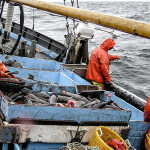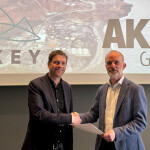A group of commercial fishermen sent a letter on 9 April to the governor of Massachusetts, U.S.A. asking for more direct involvement in the state’s plans for offshore wind development.
The letter, signed by 25 commercial fishermen and 228 fishing vessels and sent to Governor Charles Baker, was coordinated by the National Coalition for Fishing Communities (NCFC) in response to planned offshore wind projects. Three companies have bid to construct offshore wind farms south of Martha’s Vineyard, and a decision on which company will receive the bid is expected to come from Gov. Baker’s office this month.
“It is imperative that the Massachusetts wind project and any that follow, which propose to share those same waters which have been inhabited by our historic fishing industry for centuries, are designed, constructed, and operated in a way that takes into account the activity of the nation’s commercial fishing fleet,” the letter said. “Based on the past several months of interaction with the offshore wind industry, we do not have confidence that our interests are being adequately taken into account, nor will be in the future.”
The nine-page letter outlines a number of concerns, including “lack of a plan or process to study impacts,” and “no coordination or communication among projects.”
“Our view is that a ‘hitting of the reset button’ is needed. If honest communication and effective approaches to issue resolution can be established, that success will broadly disseminate and serve both industries well for years to come,” the letter said. “The reverse is also true: if the nascent offshore wind industry fails in its relationship-building in in this first round of procurement, then negative consequences will extend far beyond.”
The NCFC suggested having the New Bedford Port Authority (NBPA) become a central facilitator for communication between the wind and offshore wind industries.
“The NBPA has the technical expertise and the credibility within our community that is essential to effective communication and problem-solving among stakeholders. Moreover, as a public entity, the NBPA is in a unique, independent position to operate in this role,” writes the group. The group also cites the NBPA’s role as the nation’s most economically valuable fishing port and primary offshore wind staging port on the east coast.
In response, Massachusetts' Executive Office of Energy and Environmental Affairs (EEA) said the current administration has worked closely with all stakeholders throughout the bidding process, and has held extensive public meetings and informational sessions with stakeholders for years.
“Since 2009, the Commonwealth’s engagement efforts include over 100 public meetings and workshops, and close coordination with both the Fisheries Working Group and the Habitat Working Group,” EEA representatives said. “The Fisheries Working Group includes fishermen representing a variety of Massachusetts ports and gear types, and includes both commercial and recreational fishermen.”
At the Fisheries Working Group’s suggestion, the size of the offshore wind planning area was reduced by 60 percent, specifically to avoid priority fishing areas. The EEA also pointed out that the U.S. Coast Guard doesn’t anticipate any navigational issues within offshore wind areas, or any restrictions to fishing within the offshore wind areas.
It also countered NCFC’s argument that there is a lack of planning to study impacts.
“Recent work includes efforts to establish an independent offshore wind-fisheries science panel to review of existing science, identify key information needs, and make recommendations and oversee new or expanded studies, surveys and monitoring to inform the ongoing review and assessment of potential projects," the EEA said.
Despite the past input, the letter sent by the NCFC said more collaboration between the industries is needed.
“There is an increasing consensus among industry members that these specific issues reflect an underlying problem: The ‘fishing engagement’ efforts of offshore wind developers have shown themselves to be woefully insufficient, lacking in transparency, and unnecessarily burdensome on fishermen,” the NCFC’s letter stated. “We are concerned that our voices are being divided and diluted by the current patchwork of engagement initiatives, and we do not have any confidence that the situation will improve without firm direction from state and federal policy-makers."






